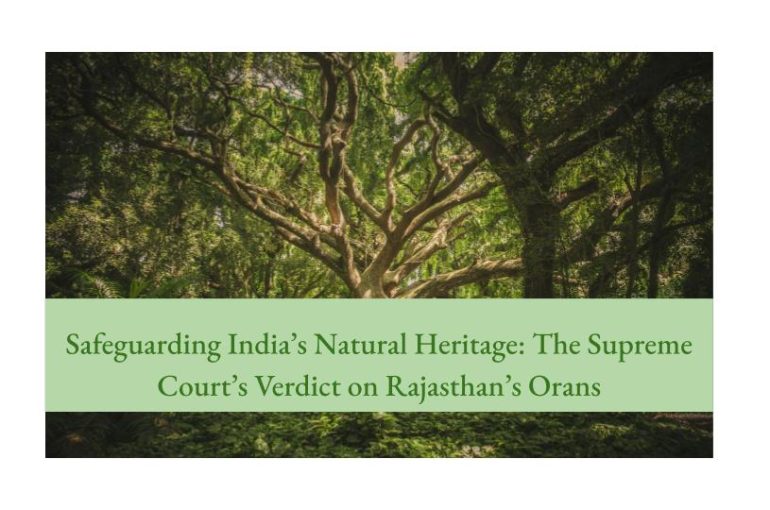Safeguarding India’s Natural Heritage: The Supreme Court’s Verdict on Rajasthan’s Orans
The Supreme Court of India has delivered a significant judgment addressing the ecological and cultural importance of Rajasthan’s sacred groves, or Orans, underlining their role in conserving biodiversity and supporting local livelihoods. This decision, part of the ongoing T.N. Godavarman Thirumulpad v. Union of India 2024 INSC 997 case, underscores the need to integrate cultural traditions with contemporary environmental conservation.
Sacred Groves: A Blend of Culture and Conservation
Sacred groves, also known as Orans in Rajasthan, are forest patches traditionally protected by communities due to their spiritual and cultural significance. These groves often serve as havens for endangered species, genetic biodiversity, water sources, and grazing lands. Despite their critical ecological roles, many sacred groves face threats from deforestation, urbanization, and resource exploitation.
In Rajasthan, sacred groves are deeply rooted in local traditions and are seen as spiritual sanctuaries. They are home to deities like Majisa and Jamboji and host species such as the khejri tree, blackbuck, and Great Indian Bustard. However, the increasing pressure on land resources has jeopardized these ecosystems.
The Case and Key Directions
The judgment responds to an interlocutory application urging the recognition of Orans as forest lands under the Forest Conservation Act (FC Act), 1980. It seeks to enforce the Court’s previous orders and recommendations of the Central Empowered Committee (CEC) for the protection of sacred groves.
Key directions issued by the Court include:
- Survey and Classification: The State of Rajasthan is to complete a district-wise survey of sacred groves, including on-ground and satellite mapping, classifying them as forests irrespective of size.
- Implementation of CEC Recommendations: All three CEC recommendations, such as including fragmented sacred groves as forests and identifying desert ecosystems as ‘deemed forests,’ must be implemented fully.
- Designation as Community Reserves: Orans are to be declared community reserves under the Wildlife Protection Act, 1972, offering legal protection and ensuring sustainable community management.
- Committee Formation: A five-member committee, including a retired judge and domain experts, will oversee the implementation of these directions.
Ecological and Cultural Significance
The Court emphasized that Orans are integral to maintaining ecological balance in Rajasthan’s arid and semi-arid regions. They:
- Combat soil erosion.
- Recharge aquifers.
- Host diverse flora and fauna.
- Reflect centuries-old sustainable practices.
The Court also acknowledged grassroots conservation models like the Piplantri initiative, where 111 trees are planted for every girl child born, blending environmental conservation with social reform.
A Critical Policy Shift
The Rajasthan Forest Policy, 2010, provided robust support for Orans, advocating legal and financial assistance and community-led management. However, the 2023 policy diluted these protections, treating Orans as general community lands. The judgment calls for revising the 2023 Policy to restore the focused protections from 2010.
Suggestions for Sustainable Management
The Court proposed:
- Community Empowerment: Recognizing the traditional custodianship of local communities and granting them formal rights under the Forest Rights Act, 2006.
- Nationwide Sacred Grove Survey: Conducting a survey to map sacred groves across India.
- Replication of Successful Models: Promoting initiatives like Piplantri village to ensure conservation through community participation.
Conclusion
This judgment reaffirms the importance of preserving sacred groves as ecological and cultural treasures. By directing the Government to recognize these areas as forests and involve communities in their management, the Court has taken a decisive step toward balancing development with environmental and cultural sustainability. The success of these measures will set a precedent for safeguarding traditional conservation practices across India.
Shikha
Associate
The Indian Lawyer & Allied Services





































Leave a Reply